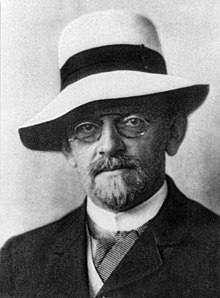David Hilbert
David Hilbert (German: [ˈdaːvɪt ˈhɪlbɐt]; 23 January 1862 – 14 February 1943) was a German mathematician. He is recognized as one of the most influential and universal mathematicians of the 19th and early 20th centuries. Hilbert discovered and developed a broad range of fundamental ideas in many areas, including invariant theory and the axiomatization of geometry. He also formulated the theory of Hilbert spaces, one of the foundations of functional analysis.
Hilbert adopted and warmly defended Georg Cantor's set theory and transfinite numbers. A famous example of his leadership in mathematics is his 1900 presentation of a collection of problems that set the course for much of the mathematical research of the 20th century.
Hilbert and his students contributed significantly to establishing rigor and developed important tools used in modern mathematical physics. Hilbert is known as one of the founders of proof theory and mathematical logic, as well as for being among the first to distinguish between mathematics and metamathematics.
Hilbert, the first of two children of Otto and Maria Therese (Erdtmann) Hilbert, was born in the Province of Prussia, Kingdom of Prussia, either in Königsberg (according to Hilbert's own statement) or in Wehlau (known since 1946 as Znamensk) near Königsberg where his father worked at the time of his birth.
In late 1872, Hilbert entered the Friedrichskolleg Gymnasium (Collegium fridericianum, the same school that Immanuel Kant had attended 140 years before); but, after an unhappy period, he transferred to (late 1879) and graduated from (early 1880) the more science-oriented Wilhelm Gymnasium. Upon graduation, in autumn 1880, Hilbert enrolled at the University of Königsberg, the "Albertina". In early 1882, Hermann Minkowski (two years younger than Hilbert and also a native of Königsberg but so talented he had graduated early from his gymnasium and gone to Berlin for three semesters), returned to Königsberg and entered the university. "Hilbert knew his luck when he saw it. In spite of his father's disapproval, he soon became friends with the shy, gifted Minkowski".
...
Wikipedia

